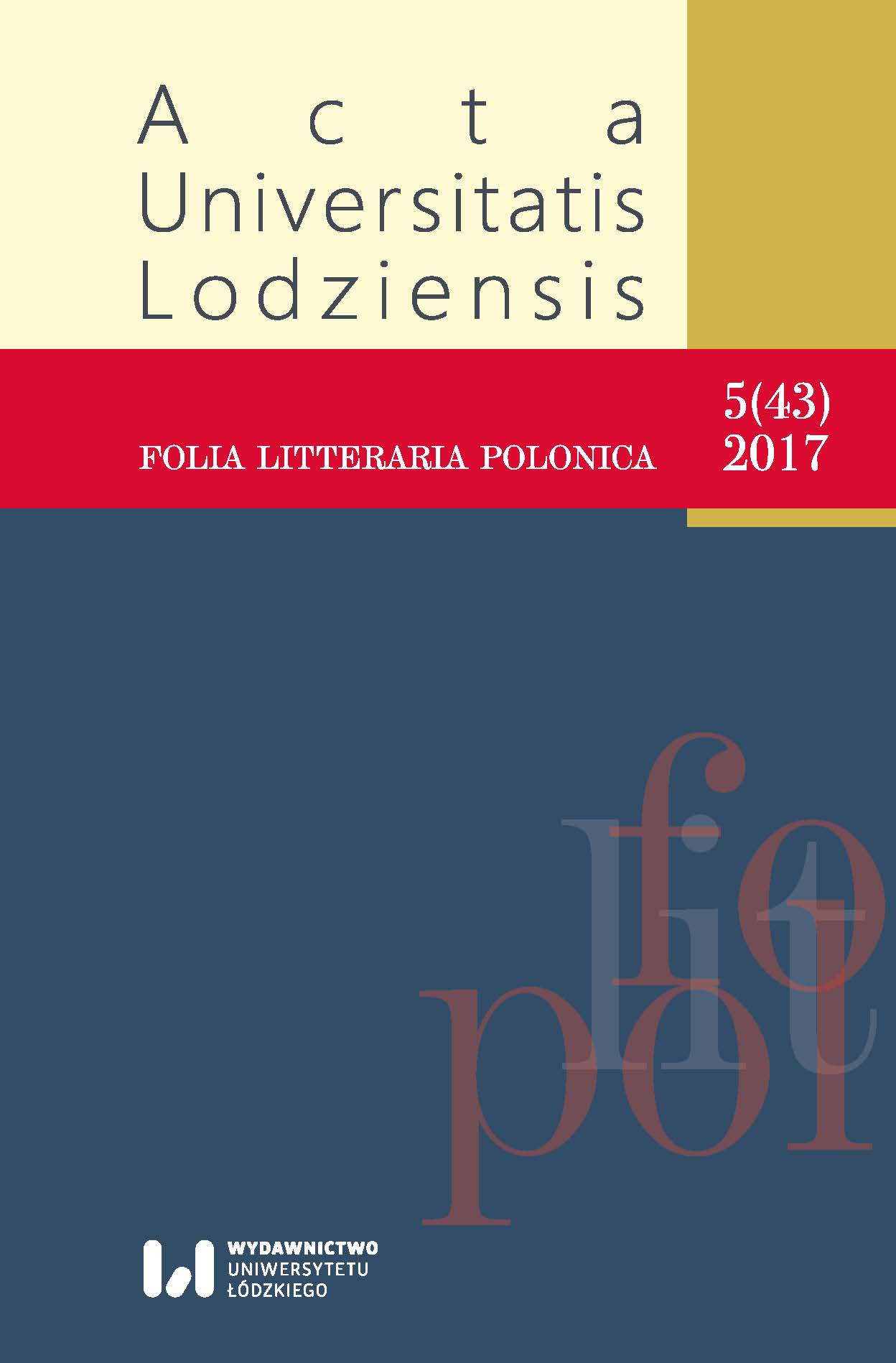The ugly in fine arts. The sensory nature of terror in the tales of the Brothers Grimm
DOI:
https://doi.org/10.18778/1505-9057.43.16Keywords:
fairy tales, ugliness, aesthetics, Grimm, aesthetic value, sensory visionAbstract
The author, inspired by philosophical aesthetic reflection, presents one of the aesthetic qualities: ugliness. Based on the assumption that “Grimms’ Fairy Tales” directly reach the realm of the unconscious, utilising towards that end not only symbolic meaning, but also a wide range of operations through imagined sensory perception, she identifies in the texts such fragments of the stories which relate to specific sensations caused in the real world using physical stimuli. The analysis constitutes only a case-based introductory study of the issue of senses in literary texts. She does not focus on the tale as an independent existential creation, which carries a multitude of interpretative references and meanings, only the possibilities offered by the analysis of a work, which consists of a transfer of a literary description to the imagination of the sensory experience occurring (hypothetically) in the receiver’s imagination.
Downloads
References
Bartmiński J., “Folklor – język – poetyka”, Zakład Narodowy im. Ossolińskich , Wrocław–Warsaw–Krakow 1990.
Google Scholar
Berleant A., “Wrażliwość i zmysły. Estetyczna przemiana świata człowieka”, transl. by S. Stankiewicz, Towarzystwo Autorów i Wydawców Prac Naukowych Universitas, Cracow 2011.
Google Scholar
Bettelheim B., “Cudowne i pożyteczne. O znaczeniach i wartościach baśni”, transl. by D. Danek, Państwowy Instytut Wydawniczy, Warsaw 1985.
Google Scholar
Bettelheim B., “O sztuce opowiadania baśni”, in: “Antropologia słowa. Zagadnienia i wybór tekstów”, G. Godlewski (ed.), Wydawnictwa Uniwersytetu Warszawskiego, Warsaw 2003, pp. 219–224.
Google Scholar
Chęcińska U., “Baśń była na początku”, in: “Barwy świata baśni”, U. Chęcińska (ed.), Wydawnictwo Naukowe Uniwersytetu Szczecińskiego, Szczecin 2003, pp. 7–14.
Google Scholar
Dziemidok B., “Główne kontrowersje estetyki współczesnej”, Wydawnictwo Naukowe PWN, Warsaw 2009.
Google Scholar
“Estetyka czterech żywiołów. Ziemia, woda, ogień, powietrze”, K. Wilkoszewska (ed.), Towarzystwo Autorów i Wydawców Prac Naukowych Universitas, Cracow 2002.
Google Scholar
Gołaszewska M., Estetyka współczesności, Wydawnictwo Uniwersytetu Jagiellońskiego, Cracow 2001.
Google Scholar
Gołaszewska M., “Estetyka pięciu zmysłów”, Wydawnictwo Naukowe PWN, Warsaw–Cracow 1997.
Google Scholar
Gołaszewska M., “Fascynacja złem. Eseje z teorii wartości”, Wydawnictwo Naukowe PWN, Warsaw– Cracow 1994.
Google Scholar
Gołaszewska M., “Kultura estetyczna”, Wydawnictwa Szkolne i Pedagogiczne, Warsaw 1979.
Google Scholar
Gołaszewska M., “Zarys estetyki. Problematyka, metody, teorie”, Wydawnictwo Naukowe PWN, Warsaw 1984.
Google Scholar
“Historia brzydoty”, U. Eco (ed.), transl. by A. Gołębiowska and others, Dom Wydawniczy Rebis, Poznan 2009 [English version: U. Eco, “On Ugliness”, Harvill Seker, London 2007].
Google Scholar
Ingarden R., „Studia z estetyki”, Vol. 1, Wydawnictwo Naukowe PWN, Warsaw 1957.
Google Scholar
Jung C.G., “Archetypy i nieświadomość zbiorowa”, transl. by R. Reszke, Wydawnictwo KR, Warsaw 2016.
Google Scholar
Leathers D.G., “Komunikacja niewerbalna”, transl. by M. Trzcińska, Wydawnictwo Naukowe PWN, Warsaw 2009.
Google Scholar
O’Neill T., “Strażnicy krainy Baśni”, National Geographic 1999, Issue 3, p. 28 (Englis version: http://www.nationalgeographic.com/grimm/article.html [accessed on: 14.06.2017]).
Google Scholar
Pareyson L., „Estetyka. Teoria Formatywności”, transl. by K. Kasia, Towarzystwo Autorów i Wydawców Prac Naukowych Universitas, Cracow 2009.
Google Scholar
Sobeski M., “Wybór pism estetycznych”, Towarzystwo Autorów i Wydawców Prac Naukowych Universitas, Cracow 2010.
Google Scholar
Szuman S., “Wybór pism estetycznych”, Towarzystwo Autorów i Wydawców Prac Naukowych Universitas, Cracow 2008.
Google Scholar











